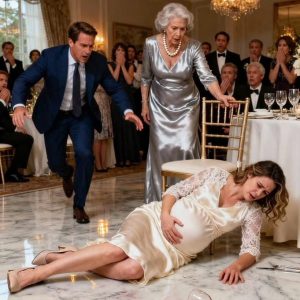The entire mansion held its breath when the reclusive billionaire entered and saw his silent, wheelchair-bound son swaying softly in the arms of the maid. What happened next was something no one could have predicted…The chandelier trembled slightly, not from any breeze, but from the soft, unexpected rhythm of a song. In the great marble hall of the Ravenshade estate, where silence reigned like a monarch and shadows clung to the corners like frightened children, something unprecedented was happening. A maid, unaware of the watching eyes, held the frail hand of a young man in a wheelchair and twirled gently, swaying to a melody only the heart could hear. Then the doors creaked open—and the master of the house returned.
Elena had only worked at Ravenshade Manor for six weeks. The vast house with its labyrinth of silent corridors and tall, unsmiling staff intimidated most newcomers. But Elena wasn’t like most. She had grown up in an orphanage, where music was her refuge and laughter was currency more valuable than gold. She was hired by the head housekeeper, Mrs. Whitmore, not for her credentials, but for her quiet demeanor and willingness to follow the rules. There was just one rule that mattered: never disturb the young master.
Young Master Theodore—the name whispered through the estate like a sacred invocation. He was only twenty-two, the only child of Mr. Alistair Graves, one of the richest and most reclusive men in the world. Theodore had not spoken since his mother’s tragic death when he was ten. An accident had taken her and left him wheelchair-bound. Rumors said he hadn’t moved voluntarily in years.
Elena met Theodore by accident.
It was her third week when she was asked to clean the old solarium, a glass-paneled room filled with light and dust. She found Theodore there, alone, staring at the garden with the stillness of a statue. Her breath caught, and she was about to retreat when he turned his head slightly toward the light.
She paused. “Hello,” she whispered, more to herself than to him. He didn’t respond.
But day after day, she found him there. Silent. Watching. So she began to hum.
Not words—never words—but melodies. Old lullabies from her childhood. Gentle waltzes her grandmother had sung beneath oil-lamps. And one day, as she swept the floors, she heard it: a slight tap. She turned. Theodore’s hand had tapped once on the wheelchair’s armrest. In rhythm.
The following day, she played music from her phone, a soft classical tune. His fingers twitched. His eyes fluttered. She dared to ask, “Would you like to dance?”
Of course, he didn’t respond. But she stepped closer, held his limp hand in hers, and swayed slowly. Not a dance, exactly—a movement, a hope, an offering of life to someone locked in silence. And in that moment, she swore she saw it: a tear on his cheek.
And so it became a secret ritual.
Every afternoon, when the staff dozed and the sun filtered through the glass like golden silk, Elena would enter the solarium and play music. She’d take Theodore’s hands and dance—sometimes with him, sometimes for him. His fingers would twitch more often now. His eyes tracked her. He was there, with her, in a way no one else saw.
But that day—the day that changed everything—she took a chance. She wheeled him gently from the solarium into the grand marble hall, a place even staff rarely entered except to polish the surfaces that never dulled. She had found an old phonograph in the library. Dusty but working. She wound it up and placed a record on it—Clair de Lune.
The music trickled like water over stones. Elena closed her eyes, took a breath, and began to move. She took his hand, his fragile fingers wrapped in hers, and danced. Slow circles. Gentle arcs. Her skirt swirled softly. Theodore’s head tilted slightly, his eyes wide, lips parted in a silence that felt less hollow now.
And then—
The door slammed open.
Mr. Alistair Graves stood in the doorway….

Mr. Alistair Graves stood in the doorway, the winter wind following him like an uninvited ghost. His presence seemed to drain the color from the marble, the gold from the chandeliers, the courage from the servants watching from the shadows.
Elena froze mid-turn, her hand still clasping Theodore’s. The record kept spinning, the needle hissing softly in the silence between notes.
“What is the meaning of this?”
His voice was low—calm, but edged with years of grief sharpened into habit.
Elena’s lips parted, but no sound came out. She wanted to explain—that Theodore had responded, that there was life in him again, that this was not defiance but a miracle. But the words died on her tongue.
“Step away from my son.”
She hesitated.
And then—something happened.
A sound, small and fragile as the first cry of a newborn bird.
“…Father?”
The phonograph needle jumped. The air cracked open.
Alistair’s eyes widened, the impossible word echoing in the vast hall. He turned toward the wheelchair, disbelief twisting into awe.
Theodore’s lips trembled. His voice was rough, unused, but real. “Father.”
The world seemed to tilt. The chandelier above gave a long, slow sigh as if exhaling thirty years of silence.
Alistair stumbled forward, his cane clattering against the marble. “Theo?”
Tears blurred his vision as he knelt before his son. For the first time since his wife’s death, the fortress of Ravenshade trembled—not from anger or fear, but from love rediscovered.
Elena stood aside, tears streaking her cheeks. She could have been dismissed, punished, forgotten—but in that moment, none of it mattered.
Theodore’s hand—once motionless—lifted, shaking, and found his father’s.
“Mother used to play this song,” he whispered. “In the garden… when it rained.”
Alistair’s breath broke into a sob. He clutched his son’s hand, pressing it to his lips.
And for the first time in twelve years, laughter—soft, broken, and human—echoed through the marble halls of Ravenshade Manor.
Elena turned off the phonograph, but the music lingered anyway—floating in the air, written into the walls, into the hearts of those who heard.
Mr. Graves looked up at her then, eyes red but gentler than she had ever seen.
“Miss Elena,” he said quietly. “You may stay.”
And in the reflection of the great chandelier above them, three figures swayed—not from the wind, not from grief—but from the quiet, sacred rhythm of life beginning again.





